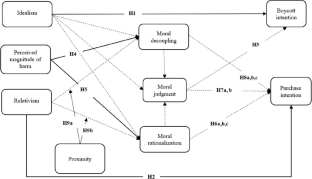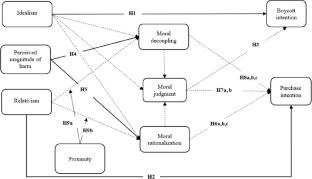The influence of personal moral philosophies on consumer responses to company moral transgressions: the role of moral reasoning strategies and moral intensity
Abstract
Consumers can continue purchasing from or boycott a company in response to unethical conduct. Moral decoupling and moral rationalization are two mechanisms that aim to explain consumer support for the transgressor company. Further, consumers can make moral judgments based on their moral philosophies. This study aims to explore the effect of personal moral philosophies on consumer responses to company moral transgressions and the mediating role of moral reasoning strategies in these relationships. Moreover, it aims to uncover the effects of two elements of moral intensity: magnitude of harm and psychological proximity in adopting moral reasoning strategies. A scenario-based empirical study with a 2x2 between-groups factorial design was conducted. Structural equation modeling (SEM) was adopted to analyze the data. Findings delineate that idealism positively affects boycott intention through moral judgment and negatively affects purchase intention through moral rationalization. This paper also indicates that relativism positively influences purchase intention through moral rationalization and decoupling. Finally, it uncovers the positive direct effect of the magnitude of harm and the moderating role of psychological proximity on adopting moral reasoning strategies.



 求助内容:
求助内容: 应助结果提醒方式:
应助结果提醒方式:


